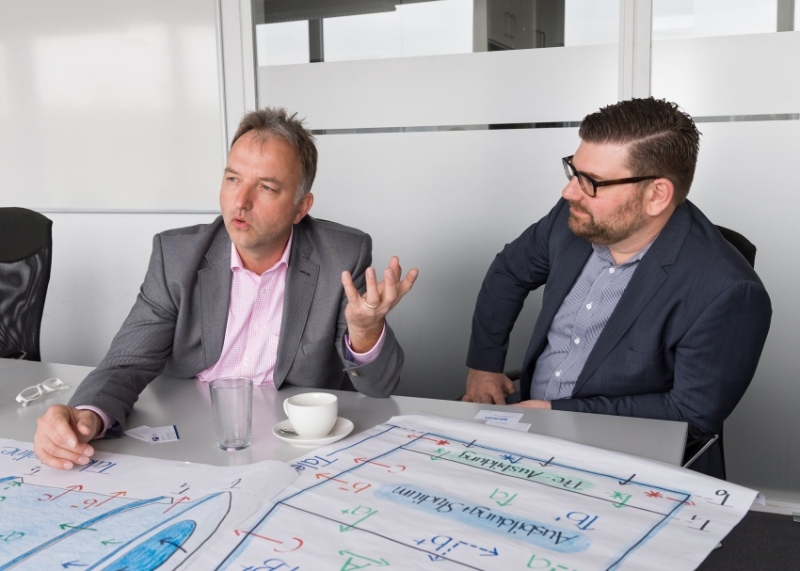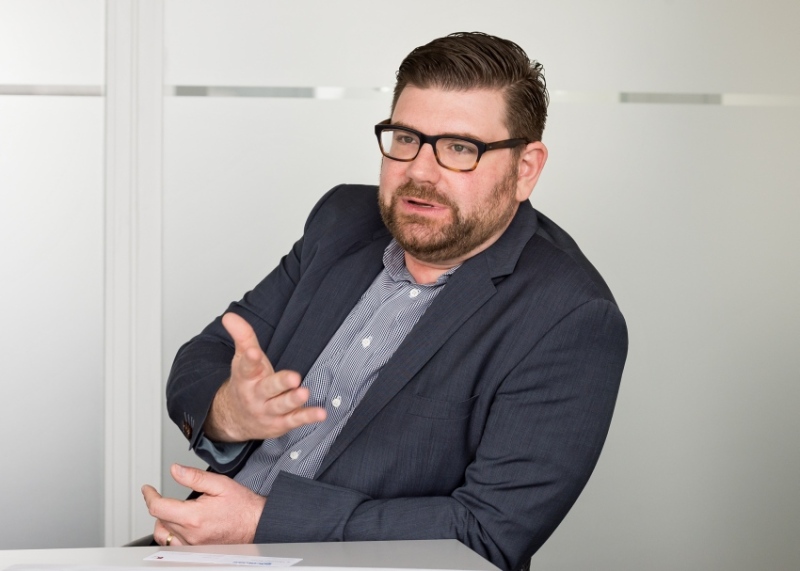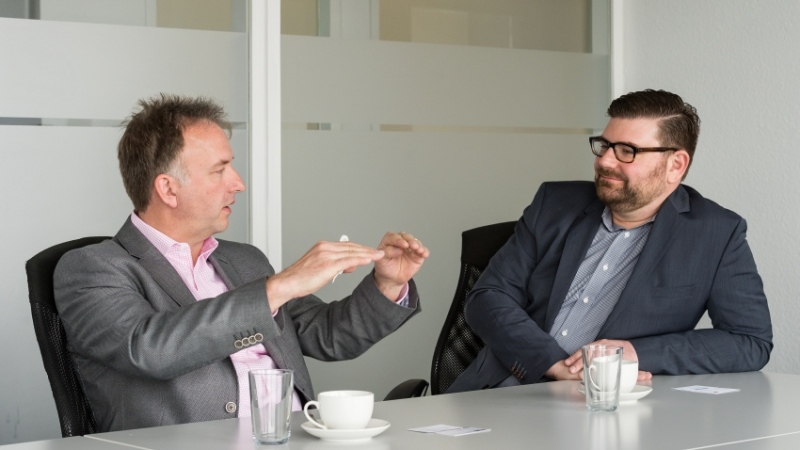Silicon Valley: not just for the corporate giants
Digital/Industry 4.0Why small and medium-sized companies should also be getting closer to the heart of the action
The digital revolution has reached every branch of industry. Many of the technological trends associated with the Industrial Internet of Things originated in Silicon Valley. Rene van den Hoevel, managing director of the German American Chamber of Commerce in San Francisco, and Christoph Ranze, managing director of encoway GmbH and executive board member of the association bremen digitalmedia, explain why it is not only large corporations who should be looking closely at the epicentre of technological advancement.

Mr van den Hoevel, why should German companies concern themselves with Silicon Valley?
RvdH: In the last three or four years, roughly 50 major German organisations have opened outposts in Silicon Valley. Their reasons for doing so vary greatly. Some companies have venture capital to invest out there. BMW, for example, has set up a €500 million fund for the next ten years. And then there are companies who are simply keeping an eye on trends and looking for interesting technologies. The third group, which includes many car makers and Bosch, are conducting their own research and development there. They are all approaching things slightly differently.
Is it worth small and medium-sized enterprises going out there?
RvdH: What we're seeing is that almost all the major corporations are already there, and in the past year or two, a growing number of larger SMEs have been arriving as well. These companies don't necessarily have to set up an office in Silicon Valley; they just need to keep an eye on what is happening out there and look for future trends relevant to their business. There are agencies that can do that for them, but I do think it's important that they come and take a look for themselves at some point as well. As a chamber of commerce, one of the services we provide is to help companies organise trips to visit Silicon Valley for a week or so.

Particularly hot topics at the moment are the Internet of Things, or IoT for short, and Industry 4.0. We are seeing huge amounts of money coming into this. In the manufacturing sector alone, the global market for the IoT is estimated to be worth US$ 17 trillion. Take, for example, the start-up Sight Machine, which extracts data from machinery for use in new business models. They say that they have difficulty attracting customers in Germany, because the companies here have more reservations about cloud-based solutions than in other countries. Mid-sized German companies need to take care not to leave it too late. That's why I think it's so important that they keep an eye on what's going on in Silicon Valley.
Mr Ranze, is encoway already represented in the USA?
CR: For me, the Valley is important in a different way. Smaller companies don't necessarily need to go to America's west coast to do business, but they do need to recognise that things are happening over there, and then decide how to respond to those developments. And the best way to do that is to head straight for the heart of the action. You have to go there to understand that digitalisation is not an abstract notion. Bahlsen might well think "Amazon is of no concern to us, it's a delivery company" until, for instance, Amazon starts producing its own biscuits. That's when you begin to comprehend the potential disruption faced by even traditional companies. Similarly, medium-sized businesses need to have a sense of how online companies operate so that they can develop their own position in the market. A trip to Silicon Valley is a real eye-opener in this respect.
As a software vendor, encoway is part of a relatively large mechanical engineering-company, the Lenze Group. What advantages does this present for either side?
CR: We started developing the software at Bremen university as part of a pilot project. Then Lenze came along with some capital, saying "What you are developing for us could surely make money from other engineering companies too." This was the basis of the company we set up in 2000 – just before the dot-com bubble burst. In our first few years of business, we won some fantastic clients and brought in decent revenue. In terms of the Lenze group as a whole, however, we were fairly insignificant. Lenze sold drive technology, we built software. But that has changed in the last four or five years, because suddenly the whole world was talking about digitalisation and Industry 4.0. This has completely transformed encoway's status within the Lenze group. For virtually every industrial company, it has become a fundamental requirement to use software and data to manage business.

Lenze currently has a workforce of around 3,500 – and through encoway it has a fully functioning software business with 200 ambitious employees. How many other engineering companies can say that of themselves? At the Hannover trade show at the end of April, Lenze was able to showcase technological advances and solutions that competitors could only dream of. With its cloud applications and ready-for-sale IoT solutions, Lenze stood out from the crowd. The recipe for success is relatively simple: companies that complement each other. On the one side you've got Lenze, a medium-sized stalwart of industry with a good understanding of technology and excellent access to the market. And on the other side of the same group you have encoway, a software developer with seventeen years of experience in the digital business. Where the two companies meet is a fascinating place.
The key ingredient in their success: the right number of skilled employees. If we keep growing at this rate, we'll need to hire another 200 software engineers in the next few years.
RvdH: Will you manage to get them?
CR: Definitely, but we will have to work hard to do so. That's why we're making an early start, for example by bringing young talent into the company. We had some cool schoolchildren here recently for another Future Day and we have further increased the number of trainee positions on offer for the coming year. We also get university students involved here from their very first semester.
RvdH: I was recently speaking with a Stanford professor who is analysing the German education system, and he said there were not nearly enough graduates leaving university with the required skills.

CR: It's true, the numbers just don't add up. Our trade association BITKOM says Germany has around 24,000 graduates from software-related degree programmes. Our branch of the software industry alone wants to recruit 25,000 software engineers per year. And on top of that, you have Bosch, Siemens, and any number of other engineering companies who want to be on the cloud and part of the IoT. And for that, they'll need software engineers – 10,000 per year in the medium term, according to the German Engineering Federation. Something urgently needs to be done about this. This is the top priority for the Bremen office as well: we need to make significant investments in training and education here! As I see it, education policy is the new economic policy. The public debate about which side of the state border a new warehouse should be built on is becoming ever more intensive, but in economic terms it is of comparatively little importance for Bremen.
Let's now look in the other direction: what can Silicon Valley companies – whether venture capital firms or other organisations – find in Germany that might interest them?
RvdH: There are around 40,000 start-ups in the Bay Area of San Francisco alone; in Germany the figure is about 2,000 in total. What they are looking for is a way in to the industry, that's to say companies that they can work with. This spells opportunity for medium-sized businesses, provided they offer the start-ups a platform on which to test and launch their products – something they can't always find in the USA. If an SME approached them in Silicon Valley and said "We can easily make your sensor technology or your visualisation technology in my factory", then the SME could strike a deal. And a deal like that can give a mid-sized company a competitive edge.
CR: That's how I see it too. In Silicon Valley it is almost impossible to purchase innovations simply as financial investments, because there's so much money at stake. The way to do it is to say I have a particular asset, such as drive technology or automation engineering, and put that on the table. Then I would look for potential strategic partners in the digital industry who could benefit from this asset.
RvdH: Precisely. The problem, however, is that many mid-sized companies have no idea what their asset is, at least when it comes to digital business models. Often it is only when they actually come to the Valley that they realise what they have to offer and can identify the weak spots in their existing business model.
Mr Ranze, what does Bremen in particular have to offer American companies?
CR: Why is encoway growing faster than its rivals? The answer is simple: we've got the people. Since the beginning of the year, we've hired eleven new employees, having posted only one job advertisement – online of course. The IT industry here might not be huge, but I think as a region we have the third highest output of IT graduates in Germany. At the moment we are training skilled workers here and sending them down to southern Germany – a kind of reversal of the regional redistribution scheme where the richer federal states help to fund the less well-off ones. As a location, Bremen could therefore be of interest to some larger IT companies as well – perhaps not for Google, but certainly for medium-sized software firms. Unfortunately, there isn't any public discussion on the subject.
Mr van den Hoevel and Mr Ranze, thank you for speaking with us.
If you are interested in investing in Bremen from abroad, please feel free to contact Andreas Gerber, head of the international relocation team, +49 (0) 421 9600-123, gerber@bremen-invest.com
Success Stories
Bremen’s Economy in Figures: Statistics 2025
The State of Bremen is a strong economic hub. A look at the latest statistics highlights its economic strength — summarising key data such as cargo volumes, export performance, industry turnover, and more.
Learn moreMedium-Sized Companies in Bremen Showcasing the Full Range of the Local Economy
Medium-sized companies form the backbone of Bremen’s economy. They create jobs and produce goods that are in demand worldwide. Here is a selection of ten businesses that illustrate the diversity of Bremen’s economic landscape.
Learn moreTwelve international food and beverage companies in Bremen
Becks and Melitta may be high-profile brands, but international food and beverage companies also manufacture lots of other products in Bremen and Bremerhaven. Here are twelve examples.
Learn more
